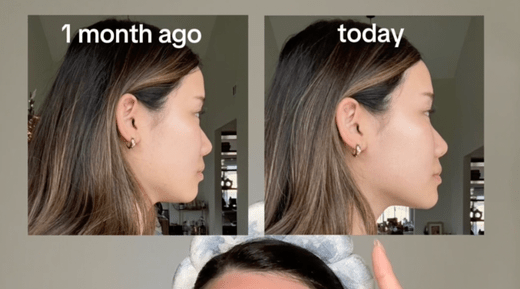Never in our wildest dreams did Brodie and I think we’d be discussing the association between mouth breathing and our facial structure but here we are! The evidence is becoming clearer and clearer, with experts like Andrew Huberman talking about mouth breathing and the correlation between an individual's jawline.
When we first started mouth taping, our goal was simple: better sleep and healthier breathing. But as we continued, we started hearing from so many of you about a surprising benefit—a more defined jawline. So today, we are going to dive deeper into why there actually is a correlation between mouth breathing and one's facial structure, along with what happens and whether mouth taping really helps your jawline. Here’s what we’ve learned.
How Does Mouth Taping Work?
Mouth taping, as you know, is a simple practice where you tape your mouth closed at night to encourage nasal breathing. It’s amazing for sleep quality, reducing snoring, and even improving energy levels during the day.
What we didn’t realize at first is that mouth taping also encourages proper tongue posture and nasal breathing habits that can impact your jawline.
What the Experts Are Saying About Mouth Breathing and Jawline Development
When we started digging into the science behind mouth breathing, we were blown away by how much it can affect not just your health but also your facial structure. Experts like neuroscientist Andrew Huberman explain that mouth breathing, especially during childhood or long periods, can lead to narrower jaws, misaligned teeth, and even a weaker airway. On the flip side, nasal breathing encourages proper tongue posture and better oxygen flow, which plays a big role in supporting jaw development and overall health. This research became a huge part of why we started Tapeher—helping people improve their breathing and sleep habits while potentially unlocking other surprising benefits.
James Nestor, the author of Breath, goes even further, calling mouth breathing the root cause of many modern issues like crooked teeth, sleep apnea, and poor athletic performance. He—and experts like Patrick McKeown—agree that breathing through your nose improves airflow to your lungs and strengthens the muscles that support your jawline. Brodie and I were especially inspired by how something as simple as nasal breathing could be a game-changer for both your health and appearance. That’s why we designed Tapeher to be small, comfortable, and effective, making it easy to stick with this habit.
Dr. Mew, a big name in orthotropics, and Dr. Mark Burhenne, a dental expert, also stress how proper tongue posture and nasal breathing can help prevent the “long face” look that mouth breathing often causes. It’s amazing how something as simple as mouth taping can help you retrain these habits, leading to better sleep, better health, and yes—a stronger jawline.
For us, hearing your stories about how Tapeher has helped you feel better, breathe better, and even look better is what drives us. As crazy as it sounds, simply becoming a nasal breather can completely change how you feel—and even how you look!
How Mouth Tape Can Help Your Jawline
- It Promotes Proper Tongue Posture: Proper tongue posture (often called mewing) is when your tongue rests on the roof of your mouth instead of lying flat or falling back. When your mouth is taped at night, your tongue naturally moves to the correct position. Over time, this forward tongue posture can help align and support your jaw, giving it a more defined look.
- It Encourages Nasal Breathing: Mouth breathing can lead to a long-term “droopy” or underdeveloped jawline. Nasal breathing, on the other hand, engages your jaw and facial muscles subtly while you sleep, helping to tone them and prevent sagging.
- It Supports Facial Muscle Strength: The simple act of keeping your mouth closed strengthens the muscles around your jawline, chin, and face. It’s like a gentle workout for those muscles while you rest, which can contribute to a more sculpted and toned appearance over time.
- It Reduces the Effects of Mouth Breathing: Chronic mouth breathing can impact facial structure—think longer faces, recessed chins, and weaker jawlines. By encouraging nasal breathing, mouth tape helps prevent these long-term effects and promotes healthier jaw development.

Other Benefits of Nasal Breathing During Sleep
While this blog is all about how mouth taping can support a stronger jawline, it’s worth mentioning some of the other incredible benefits nasal breathing brings to your overall health and sleep quality. In fact, these added perks are why so many people (including us!) swear by mouth taping as a simple, life-changing habit:
- Reduces Snoring: Mouth breathing is a major culprit behind snoring. Nasal breathing keeps your airway open, cutting down on vibrations in your throat and leading to quieter nights.
- Improves Oxygen Intake: Breathing through your nose helps air reach the lower lungs, where oxygen exchange is most efficient. This can leave you feeling more energized in the morning.
- Supports Immune Function: Your nose acts as a natural air filter, trapping bacteria, dust, and allergens before they can enter your body. This is something mouth breathing simply can’t do!
- Promotes Relaxation: Nasal breathing triggers your parasympathetic nervous system, calming your body and encouraging deep, restorative sleep.
- Enhances Athletic Performance: Proper nasal breathing increases lung capacity and helps regulate your breathing patterns, which can improve endurance and performance during the day.
These benefits, combined with its impact on your jawline, make nasal breathing—and mouth taping—a powerful tool for improving your health. With Tapeher, it’s easy to build this habit into your nightly routine and wake up feeling (and looking!) your best.
The Bottom Line
We didn’t start Tapeher with jawlines in mind, but the feedback from all of you—and the science behind nasal breathing—makes it clear: mouth taping can help support a stronger, more defined jawline.
Of course, it’s not an overnight fix, and consistency is key. Pairing mouth taping with good sleep habits and proper tongue posture can make a real difference not just for your sleep, but for your overall health and facial structure, too.
If you’ve noticed changes to your jawline since using Tapeher, we’d love to hear about it! Share your story and tag us @tapehersleep—you might just inspire someone else to give it a try.
To better sleep and stronger jawlines,
Phil & Brodie
Founders of Tapeher

